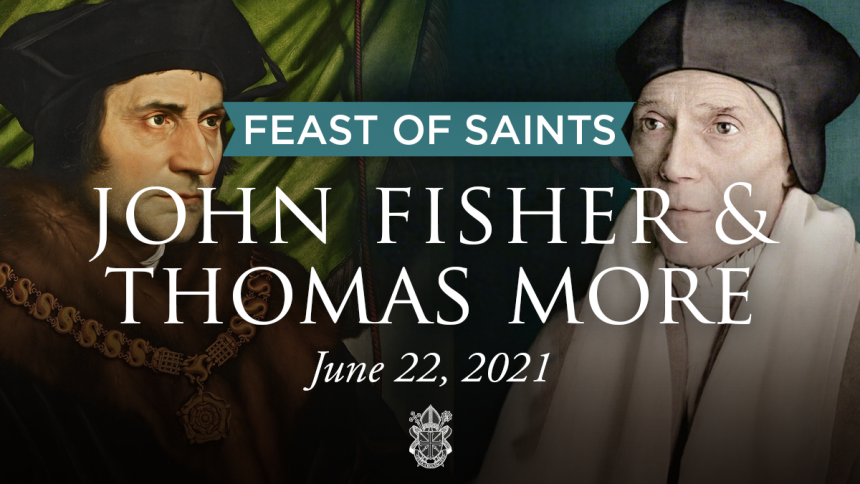
Here's a great article by Will Bloomfield, the Diocese of Lansing's General Counsel, on why we should revere, love and imitate the lives of those great 16th century Englishmen: Sir Thomas More, Chancellor of England, and Cardinal John Fisher, Bishop of Rochester, whose feast day is today, June 22. Happy feast day! Will writes:
June 22, 1535 is the day Fisher was beheaded. More would follow to the chopping block two weeks later on July 6. Both are remembered for their conscientious defense of the indissolubility of marriage as they famously refused to accept King Henry VIII’s “marriage” to Ann Boleyn because Queen Catherine remained Henry’s wife. They are also both considered patrons of religious liberty, and More is a patron of lawyers, statesmen, and politicians."
But these holy men did not just have a courageous and holy death as martyrs for the faith. Rather, they lived saintly, prayerful, and ascetic lives, conforming themselves to Christ and refusing to conform to the world."
St. John Fisher, who is less well known, was Bishop of Rochester and Chancellor of Cambridge University. In addition to his roles as a shepherd and administrator, he was a dedicated intellectual, sparring in writing (as did More) with Martin Luther and other leading Protestants. Fisher was known (and so was More) to wear a hair shirt and to sleep on boards. Perhaps it is no surprise that when the time came to sacrifice comfort, position, and even their lives, both men remained faithful to God and were willing to do so."
St. Thomas More is, of course, the better known of the two, particularly from Robert Bolt’s depiction of him in the play A Man for All Seasons—also an Academy Award winning movie (and one of my personal favorites). James Monti wrote an excellent book The King’s Good Servant But God’s First on More that delves much more deeply into his life than the play/movie was able. In reading Monti’s book, I was heartened to learn that many of More’s lines from the movie, particularly at his trial, come right out of the historical record from his correspondence or from the trial transcript."
Our times are much different than the time of Henry VIII, but the pressure to conform to the world remains. We would do well to emulate these two English saints who never wavered in their faith and refused to conform themselves to the world. I’ll close with a moving account of St. John Fisher’s death that comes from Saint John Fisher by E.E. Reynolds:
“Christian people, I am come hither to die for the faith of Christ’s Catholic Church. And I thank God, hitherto my stomach hath served me well thereto, so that yet hitherto I have not feared death. Wherefore I desire you help me, and assist me with your prayers, that at the very point and instant of my death’s stroke, and in the very moment of my death, I then faint not in any point of the catholic faith for any fear. And I pray God save the king and the realm, and hold his hold hand over it, and send the king a good counsel.”
The witness described the words previously quoted as follows: “These words, or words of like effect, he then spake with a cheerful countenance and with such a stout and constant courage as one no wit afraid but glad to suffer death. And these words spake he so distinctly and perceivably and also with such a strong and very loud voice that it made all the people astonished, and noted in a manner as a miracle to hear so plain, strong and loud a voice come of so old, weak and sickly a carcass; for the youngest, strongest, and healthfulest man there present could not have spoken stronglier, louder, plainer, nor better to be perceived.”
They then had him lie flat on the scaffold, inserted a block under his neck, and chopped off his head.
St. Thomas More and St. John Fisher, pray for us!
